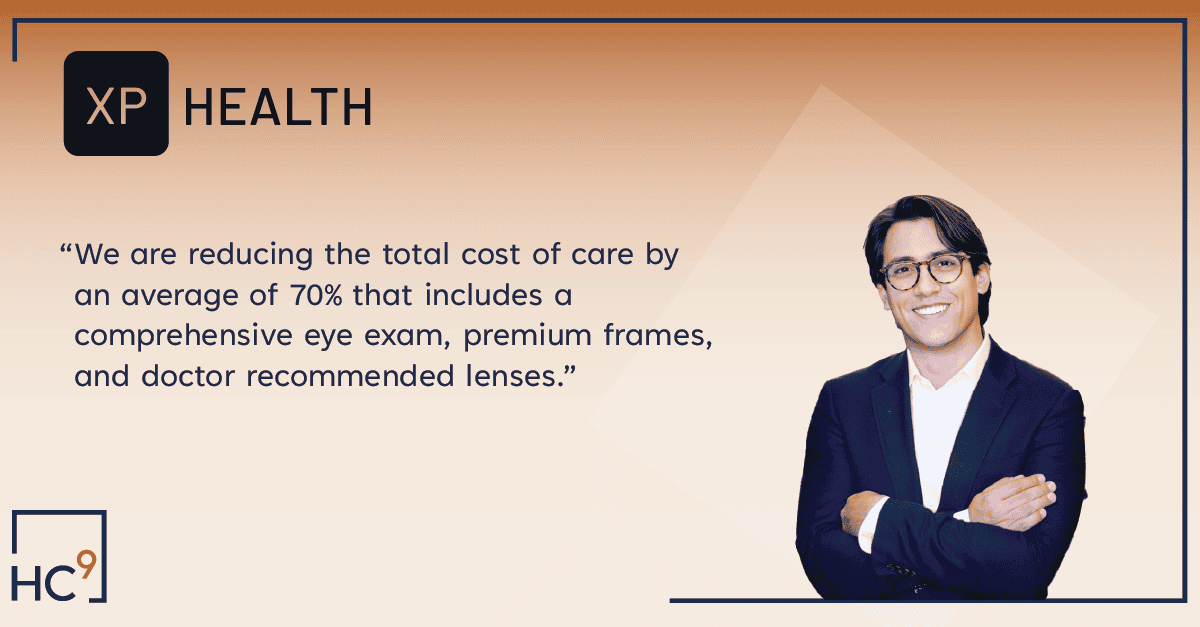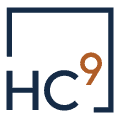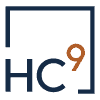
HC9 presents an interview series with portfolio company leaders. We’re interested in how they are solving health care’s biggest problems, what drove them to start a company, and why they chose to work with HC9.
Richard Lungen (Founder and General Partner, HC9 Ventures)
Today we’re chatting with Antonio Moraes, CEO/Co-Founder of XP Health. Antonio, thank you for being here today. What inspired you to found XP Health?
Antonio Moraes (CEO/Co-Founder – XP Health)
Growing up in Brazil my nickname was Antoculos which means “Antonio glasses” making fun of my name because I used to wear very thick glasses, minus 7.5 myopia.
I did LASIK when I was 18, so I went back to having perfect vision and forgot about anything related to vision for a little over a decade. Then professionally when I was 20 years old, I set a goal for myself of impacting one million people. I started a venture capital firm. It took me four years to raise $40 million. Long story short, after nine years, two of the companies that I invested in surpassed the one million people goal.
I then decided to attend Stanford University Graduate School of Management and decided to sell my shares in the fund. The idea for XP came when I met James Wong, my co-founder. He’s a machine learning engineer and was at Facebook and Airbnb. I remember him describing how great his benefits were at Facebook, but vision was the lowest value, most boring benefit that they had. He had to go in person to see an optometrist. He was being upsold to buy glasses.
At this point, we had an important moment in our journey. We went to China and we found the manufacturing companies making the frames for Rayban and Gucci among others. We found that if you’re able to buy from the factory, the cost of a pair that retails for five hundred dollars, really costs ten to produce. The lenses that retail for three hundred dollars, really cost five. So vision insurance; we concluded it’s a $40,000,000,000 scam. We asked ourselves, what’s the benefit to your employer or you as the employee? You’re paying ten dollars per month, so a hundred twenty dollars per year to get the benefit. You get an eye exam covered which in reality costs forty or fifty dollars. That’s the reimbursement cost and then a pair of glasses that cost $30, being generous. It makes no sense.
Combining my personal history and James’ who also grew up wearing glasses from the age of 8 with this giant market opportunity in a big, sleepy, outdated industry, helped us create the vision for XP Health.

Richard Lungen
Can you comment on the larger impact and the greater potential that you see for XP globally?
Antonio Moraes
Starting with the global perspective, vision is the most important human sense that we have.
There are about five billion people wearing glasses, but everyone needs protection against the sun, against screens, especially in the technology centric world where we live. There’s an explosion in the number of hours that we’re all having in front of screens.
When we think specifically in the U.S., the opportunity, or the gap in healthcare is that there are two main players, VSP and EyeMed. Combined they have $13 billion in revenues, and both have a negative NPS, typically a minus eight net promoter score.
As we look at most healthcare verticals where there has been innovation such as mental health, MSK, primary care, telemedicine; vision is still there in the past, largely as it was created decades ago, and so it is still ripe for disruption.
Richard Lungen
How does XP do it differently if I’m the customer or the consumer?
Antonio Moraes
We create a digital-first vision benefit that is able to do two things.
One, we reduce the total cost of care by an average of 70% and provides a comprehensive eye exam, premium frames, and doctor recommended lenses. We reduce from typically $199 with a PSP plan to $35; a giant reduction in cost.
The second benefit is with the platform that we have and the technologies that we have created. One example is a face scan. It uses computer vision and deep learning to map your face and recommend the best frames that will fit your face. It’s kind of Netflix for glasses. And then of course, you use a virtual try-on with augmented reality to see the frames on your face. The next step is an AI personal stylist, very conversational and far more personalized than what we have today.
Our NPS is 70 points higher than our primary competitors. So while VSP and EyeMed have typically minus 8 NPS as I mentioned, we improve it to over 65 points.
Richard Lungen
When does that launch?
Antonio Moraes
We’re launching the AI stylist in Q2 this year.
Richard Lungen
What about eye exams? How does XP Health work if I’m also needing to get my eyes examined?
Antonio Moraes
Very important. We built everything that I described on top of a national network with 99,000 providers, including Lens Crafters, Walmart, Target, all the major retailers and private practice optometrists. Our members all have access to an in-person exam. While we fully support and encourage in-person exams where warranted, for those between 18 and 55 years old with no past history of eye disease for in their family, there may be an opportunity to renew their prescription online with a remote optometrist that signs off a new prescription, an FDA approved process. It’s another layer of convenience for our members. So, the experience can primarily be online, but then we do have the network for everyone that needs to go in person.
And the same thing goes for social determinants of health. If they need assistance, we help coordinate that assistance with a social service agency or a non-profit.
Richard Lungen
Looking ahead, what are the goals for 2024 and then long term, what do we think we’ll see out of XP Health?
Antonio Moraes
We have three big objectives.
One is to disrupt the current vision benefit which in our eyes fails to benefit consumers or employers.
Two is to become a $10 billion company.
Three to impact one billion people, which is the hardest of the three goals, right? But we will achieve that by using technology in a very disruptive way.
Richard Lungen
How will you get there? To impacting a billion people?
Antonio Moraes
We believe that we’ll achieve that through the AI capabilities that we are developing now. The current experience around vision care revolves around the exam, with an eye doctor and the purchase of glasses.
We feel we can automate a lot of this process with AI. Just imagine an AI doctor and then an AI personal stylist for eye wear.
We’ll be launching our AI stylist in three months, as I’ve mentioned, and we keep improving. The eye doctor part is trickier, and we have the online prescription renewal already. From there we’re launching a smart care assessment which creates an AI generated personal care plan.
We’re beginning to create the building blocks for this AI eye doctor. And then we would be able to make it available for a billion people for free using massive scale and technology resulting in an extremely lowmarginal cost.
Richard Lungen
Why HC9?
Antonio Moraes
HC9, from all the funds that we met, has the best, the largest and the most connected network with the highest value for our type of business. The distribution opportunities that we have through the network are just gigantic.
As we work with HC9 and its proven healthcare LPs, which is the case already, we can become a billion dollar company overnight.
We can be embedded within some of the largest health plans and even in ancillary carriers in the country. As a matter of fact, even in the brief relationship that we have, there’s already a massive contract that we landed because of two LPs.
The impact of HC9 has been massive. Huge. Huge. Especially the feedback and the expertise, at the board level, from Richard, Jon, and Charlie, plus the knowledge base within the LP network.
All those things are so differentiated versus a generalist fund that maybe did just a couple of investments in health care, but they don’t work in our industry.
Richard Lungen
Is there anything else you want to add?
Antonio Moraes
I’d like to comment on why we are unique at XP Health.
We have a strong culture that is focused on humility.
I think with humility, you tend to have a growth mindset, a learning type of culture that makes things faster on the product development side. You listen to other folks more intently than if you already know all the answers.
It means we’re listening to our customers in a way that our competition, VSP and EyeMed, just neglect.
It means that we’re listening to our employees in a deeper way as well. So, we can improve processes, improve the products that we have. So, it’s a fundamental part of the company as well.
About XP Health
XP Health democratizes access to high-quality, delightful experiences in vision care that double coverage and reduce costs. It is a digital-first vision platform focused on eye exams and eyewear that uses customer-centric design and technology to create a better member experience and improve access. XP Health was founded to combat the often confusing, expensive, and frustrating experiences common with vision care and vision insurance. XP Health was named to Fast Company’s 2021 list of “The World’s Most Innovative Companies,” and over the past year has expanded from 30 to 1500+ customers, including DocuSign, Navistar, Chegg, Sequoia Consulting, and strategic partner Guardian Life Insurance. To learn more visit xphealth.co.

